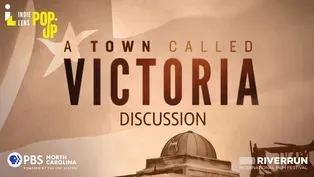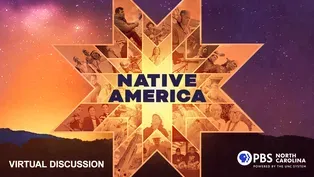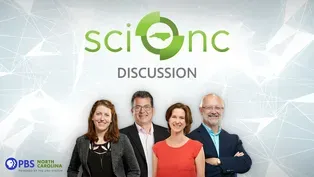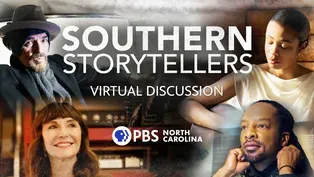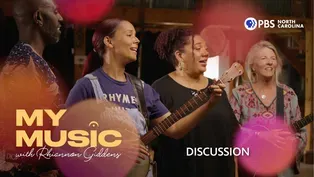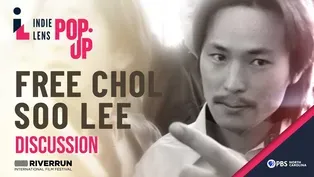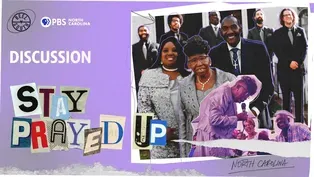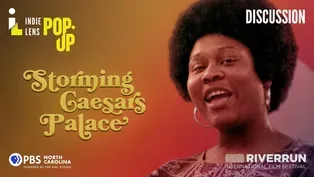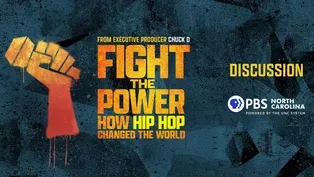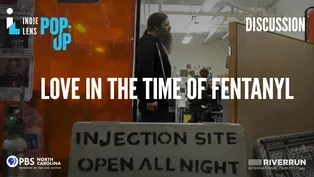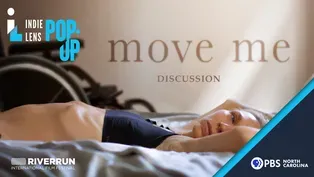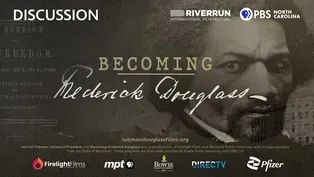PBS North Carolina Specials
Discussion - Mama Bears | Independent Lens
6/13/2023 | 34m 41sVideo has Closed Captions
Producer and director Daresha Kyi discusses the film and LGBTQIA+ advocacy.
Josh Clinard, associate producer, PBS North Carolina, leads a conversation about the film, religious barriers to LGBTQIA+ acceptance and how the organizations Mama Bears and Free Mom Hugs emerged. Our panelists: Mama Bears producer and director Daresha Kyi and Sara Cunningham, founder of Free Mom Hugs.
PBS North Carolina Specials is a local public television program presented by PBS NC
PBS North Carolina Specials
Discussion - Mama Bears | Independent Lens
6/13/2023 | 34m 41sVideo has Closed Captions
Josh Clinard, associate producer, PBS North Carolina, leads a conversation about the film, religious barriers to LGBTQIA+ acceptance and how the organizations Mama Bears and Free Mom Hugs emerged. Our panelists: Mama Bears producer and director Daresha Kyi and Sara Cunningham, founder of Free Mom Hugs.
How to Watch PBS North Carolina Specials
PBS North Carolina Specials is available to stream on pbs.org and the free PBS App, available on iPhone, Apple TV, Android TV, Android smartphones, Amazon Fire TV, Amazon Fire Tablet, Roku, Samsung Smart TV, and Vizio.
Providing Support for PBS.org
Learn Moreabout PBS online sponsorshipMore from This Collection
Discussion - A Town Called Victoria - Independent Lens
Video has Closed Captions
The filmmaker and former Victoria residents share their story. (46m 51s)
Discussion - Native America Season 2
Video has Closed Captions
Panelists discuss preserving the languages of Native American tribes. (39m 1s)
Video has Closed Captions
Sci NC executive producer and host, Frank Graff, chats about upcoming Season 6 of Sci NC. (26m 6s)
Discussion - Southern Storytellers
Video has Closed Captions
Author David Joy and others discuss storytelling and their new PBS series. (42m 13s)
Discussion - My Music with Rhiannon Giddens
Video has Closed Captions
Discussing the series with producers Will & Deni McIntyre and country artist Rissi Palmer. (39m 56s)
Discussion - Free Chol Soo Lee | Independent Lens
Video has Closed Captions
Local lawyers, professors and nonprofit leaders discuss wrongful convictions and reentry. (40m 44s)
Discussion - Stay Prayed Up, Reel South
Video has Closed Captions
The filmmakers discuss their journey with Mother Perry and The Branchettes. (45m 4s)
Discussion - Storming Caesars Palace | Independent Lens
Video has Closed Captions
Local professors and nonprofit leaders discuss welfare and the social safety net. (33m 2s)
Discussion - Fight the Power: How Hip Hop Changed the World
Video has Closed Captions
Local experts discuss the history of hip hop with PBS North Carolina. (59m 43s)
Discussion - Love in the Time of Fentanyl | Independent Lens
Video has Closed Captions
Local harm reductionists, therapists and others discuss the opioid crisis and more. (55m 44s)
Discussion | Independent Lens: Move Me
Video has Closed Captions
A dancer with blindness and disability advocates discuss adaptable arts programs. (38m 46s)
Discussion | Becoming Frederick Douglass
Video has Closed Captions
Scholars, professors and historians discuss the life and legacy of Frederick Douglass. (43m 43s)
Providing Support for PBS.org
Learn Moreabout PBS online sponsorship- Thanks so much for joining us.
We're really glad that you joined us for this special advanced screening of the "Independent Lens" film "Mama Bears."
I'm Josh Clinard.
I'm an associate producer at PBS North Carolina, which is your statewide public media network.
And as the proud son of a mama bear, I'm especially excited to share this film with you tonight.
Every June, we like to spotlight the accomplishments and contributions of the LGBTQ+ community with new programs, series, and inspiring, and like this one, sometimes challenging documentaries.
As we continue our pride celebration, we're so excited to bring you this film and the special opportunity to hear from the director and someone you just saw a lot of in the film and maybe brought you to some tears in that wedding scene.
We want you to know that this is a safe space to have a meaningful and authentic conversation.
So please add any questions or comments you have in the chat feature on the right of your screen.
I've already seen so much activity in there with some really inspiring stories, so please keep posting those.
And we just ask that you be respectful and thoughtful when you add any questions in there.
So without further ado, I would like to introduce our special guest tonight.
We have Daresha Kyi, who's the producer and director of "Mama Bears," and Sara Cunningham, who was one of the mama bears featured in the film and founder of Free Mom Hugs.
Thank you so much for joining us.
- Thank you for having us.
- Well, I just wanted to start, Daresha, if we wanna talk through the journey.
Where did the story come from?
How did you find it, and how did you get involved?
- I was lucky to discover the mama bears in 2017.
I had just finished my first feature-length documentary about Chavela Vargas and was on the festival circuit and knew that I needed to strike while the iron is hot.
So I was looking for another story.
And I came across an article about Kimberly and Kai's fight for Kai to use the girl's bathroom.
And in that article, Kimberly mentioned that she had found the support she needed to become a mama bear through this private Facebook group that had about 2,000 moms in it.
And I was really intrigued.
And I reached out to Liz Dyer and told her that I thought that they were very heroic.
And I was interested in making a documentary and what did she think.
And she said, "Send me an email, and I'll forward it to the moms.
And we'll see.
We'll see how they respond."
And I basically asked people to reach out and just share a little bit of their journeys.
And I got 25 responses.
So that's how it all started.
- Okay.
And then how did you get connected with Sara?
- Liz, in that first conversation, told me that Sara was actually starting her first Free Mom Hugs tour.
And I was living in New York at the time.
I'm based in Atlanta now, but I was in New York.
And she was coming to New York.
Those scenes you see at Stonewall Inn and at the Home for Hope in Philadelphia, the shelter for LGBTQ unhoused people, those were the last stops on her first tour, and that was the first thing I shot, was in the Home for Hope.
And then we did interviews at a friend's apartment, and then we shot with them at Stonewall Inn.
- Great.
- Yeah.
- And Sara, what led you to be a part of this documentary?
I know that you had to be very vulnerable and relive some moments that probably weren't the highlight, some of the best moments of your life.
- Yeah.
What led me to be a part of it is that just as Daresha was in the interviewing process, I was finding the support and the resources I needed in this private online Facebook group.
That I was finding my voice and being able to be visible and vocal about what I was learning about the community.
And I was eager to talk about it because I was accountable to what I was learning.
So it was a perfect opportunity, perfect timing for where we were as a small chapter here in Oklahoma City and in the beginning of the tour.
It couldn't have happened at a better time.
I'm so thankful that we had it.
- That's great.
And I love the North Carolina scene.
We have a lot of people here from North Carolina.
We also have a lot of people from around the country tuning in, which is really cool.
But I'd love to hear more about that scene.
I know there was one scene in Hot Springs, North Carolina that a lot of people were excited to see.
So if you could tell us just a little more about the filming that you did do in North Carolina.
- Well, I'll set it up, and then, Sara, you can hit it.
I'll set it up so you can strike it.
I found out that the mama bears were going to have a booth at this convening that happens every summer called Wild Goose Festival.
And we were there, I think we were there for three days, and we shot for two of those days.
And it was hot, it was humid, but it was fun.
It was a lot of fun.
And Sara was speaking there.
So Sara, you wanna talk about your experience?
- Yes, Wild Goose is just one of the pivotal moments in my life.
You have a place set aside in Hot Springs at that time.
Now they're in a different location, but it was of all faith, of music and art and social justice, speakers from all over the country, from all different faith backgrounds.
And it was a real eyeopener of such diversity.
And, I mean, they had like a beer tent that they sang hymns at and drank beer to just give you a little bit of a vibe that they had there.
But it's an extraordinary place.
Wild Goose Festival, you can find it online.
They're in a new location now.
But it was a pivotal time in not only my faith and the deconstructing and the reconstructing of my faith.
And it was just a beautiful time in our lives, and I'm so glad that Daresha was there.
- Yeah.
And I love that you had that time here.
And I know, Sara, we talked before this, and you were telling me that there is a really great Free Mom Hugs group in North Carolina.
- Yes.
I'm so proud of the chapter that we have in North Carolina.
We have a chapter leader that has co-chairs and volunteers, and they're probably one of our most active chapters.
You can go to Free Mom Hugs North Carolina, follow that social media link at the Facebook or Instagram, and that will keep you in the loop of everything happening locally.
This chapter state leader has been with us since the very beginning.
Just represents Free Mom Hugs so beautifully, and I couldn't be more pleased with the work that they're doing there in North Carolina.
- And if you're looking for it, I know there's people from our team that are putting that in the chat that you can check out.
But Sara, so when I googled you, I thought it was interesting, it came up saying that Sara Cunningham, author, activist, and founder of the nonprofit organization.
So the word "activist."
I guess I was just curious, how do you feel about that word?
Because I know a lot of times, I'm assuming when people decide to have kids, they don't intentionally think that being a mom is gonna make them an activist.
So is that something you identify with an activist?
Tell me more about that.
- Well, it's a great question.
Early in my advocacy, I became, some people called me the accidental activist because I was accountable to what I was learning and hearing and experiencing from the community.
But here, recently, I've been called a political activist.
And I'm really trying to not necessarily fall under that category because I'm an ally.
I'm a strong and faithful ally.
And how can I not advocate for laws, for example, that affect my family and my friends?
And also, being a nonprofit, you know, I need to be careful politically, in the political arena, and try to stay not neutral, by any means, but to be approachable.
And so I like to think of myself as an accidental activist or a very strong and faithful ally advocate.
So know the difference between advocating and, you know.
I can't think of the word.
- Activist.
- In that space- - Active ally.
Ally.
- Thank you.
- Active ally.
Daresha, I was curious.
So there's a long journey of this film.
You don't just go and shoot it, edit it, put it out to be broadcast, which is next Tuesday night.
I know that you've been doing a lot of tours of this around the country.
I'd just love to hear more about what that looks like and what you've been seeing as you go to so many different parts of the country.
And I know some have been in big cities, some have been very rural.
- So the film premiered last year in March at South by Southwest, and since then, it has been on the festival circuit.
So we've been doing festivals all over the country.
And since the beginning, one of the things that's happened is that churches and mama bear groups have reached out to us and asked to host screenings.
And so that's also been happening the entire time on a case-by-case basis.
And then this year we have the PBS screening, which will happen next week.
Can't believe it's already here.
It seems like a long time coming, but now it's finally here.
And it's been an amazing journey traveling with the film.
One thing I'm really proud of is that everybody in the film is interested and willing and able to travel with the film and to speak to audiences.
And that just speaks volumes to me and is the greatest honor that people like Sara, they stand behind the film.
But having the film screen and traveling myself with it, I've been lucky to see its impact firsthand, and that's been amazing.
You know, there was a mom in Seattle, a grandmother in Seattle, who raised her hand during the Q&A.
And this was a very small screening of, I think, 13, 15 people.
Something like that.
So there was a big lesson for me in that, in thinking that, you know, the size of the audience matters.
It doesn't because that grandmother told me in the Q&A that she was an Evangelical Christian who had a non-binary grandchild that she had been struggling to accept and understand, and that now that she'd seen the film, she did understand, and she knew what she had to do.
And that was join the Mama Bears.
[laughs] - Yeah, if I could add, to join the Mama Bears, we, you know, need to mention Liz Dyer, the facilitator, founder of the Mama Bears, the group, the private online Facebook group for moms with LGBTQ kids.
When I found the group, there were 250 moms.
Now there's probably close to 40,000.
But it was a wellspring of support and resources, and it was a pivotal resource in my family and my faith walk.
And I did see a couple of questions there wondering about the faith of the group.
It's from all faith walks.
We have some atheists in the group.
All are welcome there.
It's for moms with LGBTQIA kids.
Fathers are welcome.
They have subgroups for trans 'cause the dynamic's a little different there.
But to find out more, you can email mamabearsrock.
And I hope we'll put it in there, but mamabearsrock@gmail.com and find out more information there.
And it's such a wellspring.
- Thank you.
And thank you, Liz.
I believe I saw you in the chat, unless I made that up.
So thanks- - She was there.
- for being in the screening.
So Sara, similar to what Daresha was saying about some of those comments she's hearing, I was just curious, as you're meeting more moms and they're joining the group, what are those aha moments that those moms are telling you, where if they were struggling with something and then there was that tipping point, where they really, they understood, and that's when they really leaned in?
- Mm-hmm.
I could say the aha moment was, once I joined the group, I realized that we were all having the same experience, feeling alienated from our families, from our church homes, and from many parts of society, as we were learning laws that affect our families.
But I think the key is to get educated.
And we need to hear from someone who shares our faith, that it's okay to search the matter out.
And that's when you find your voice.
You're able to change the conversation at the water cooler, your place of worship, and your workplace.
And ultimately, it's seeing our children happy and healthy and having authentic relationships with our children.
And I know Liz could say, has said, "Until every household could become affirming, that will bring about the change in the world that we need to protect our families."
And I think just seeing your children happy and healthy.
- And I saw one of the questions in the chat box.
Are there any great resources you have used or seen shared that help, whether with theology or other points, of how parents and families can understand how this friction is oftentimes understood between what's often being taught and what we're seeing and hearing?
- Yeah, the first book that I ever read was "Torn," T-O-R-N, by Justin Lee.
And it was reconciling the bridge between the church and the gay community.
And I can send a bunch of resources there.
But in the private online Facebook group and on a public page, Liz Dyer has a wellspring of resources.
And you can find it on our website as well at freemomhugs.org.
But the good news is, Josh, there are so many wonderful resources out there that really the only choice is to remain in fear and ignorance.
Really.
Because there's so many wonderful resources out there.
- Daresha, I'm curious, as you've been doing so many tours, I think you had said the film stopped filming sometime in 2020.
And I think it looks like it ended in 2021 as far as maybe the edits.
A lot has changed in the country since then.
Even in the past couple of months and in the past year, it seems like there's so much in the news about states and local government looking into transgender rights.
I'm just curious what it was like for you as you've been, as those parallel journeys of what's been happening in the news and what's been happening in the government side and what you're seeing and how that's kind of informed your perspective of both of those.
- You know, the film came out.
We premiered at South by on March, I think, 13th.
It was the week after Lieutenant Governor Abbott, and we were in Texas 'cause we were at South by, and that was the week after Lieutenant Governor Abbott had issued his directive to Child Protective Services to treat families with trans kids who were gender affirming as if to open up child abuse investigations into those families.
And so, you know, the thing is that, you know, when you have this vision of making this film, you think, "Oh, it's gonna come out.
It's gonna be at Sundance.
It'll be starting off the year.
Blah, blah, blah."
You have all these plans, and then life happens, and then you realized that it was actually divinely perfect that it come out in Texas at that time, right?
Because it was and is and continues to be an answer to that, you know, kind of hateful rhetoric and hateful activity.
The film counters that.
And so I'm just very grateful that it came out when it came out, and that we now have it as a tool that we can use to open hearts and minds, to change people's hearts and minds.
Because we need change desperately.
- This is such a good tool for that.
Sara, I'm curious to hear your perspective on that.
- I'm sorry, what was the question?
I was thinking of something else.
- Well, if you have something else you wanna bring up, I'd love to hear it, but- - Well, I've seen all the wonderful comments going on here.
And forgive me for that.
I'm sorry.
But I think that I'm reminded of the numbers, the fact that one affirming person can lower the suicide at-risk behavior for the LGBTQ community.
And it's even more for our transgender friends and family.
And I know at one time there were probably 300 people on the screening that I'm so thankful that you provided, but if you just think about the impact of 300 people being that one person for someone outside of their immediate, or, you know, in their circle of friends and family.
That what a difference that could make if we could just let our family, our friends, our coworkers, our colleagues, our patrons, our extended family know where we stand.
The good things about the horrible policies that are taking place is that it's making people have a conversation.
And just focus on that there are more Americans in favor of equality and inclusion that are against it.
But we must be vocal because a huge percentage of Americans have no idea that there's problems.
So that's what needs to happen.
Films like this, conversations like this.
And for example, one more thing and I'll shut up, is that our governor here in Oklahoma tried to stop PBS from showing, tried to remove funding and access to PBS because he felt like we were indoctrinating children.
I mean, this is what we're dealing against.
But luckily, a federal judge saved it.
But this is the conversations that we're having.
And people more and more are standing up.
Even in Florida, the high school kids are having their own proms.
They're standing up and saying, "We're not going back.
We're not going anywhere."
And that gives me great hope.
- Thanks for sharing that.
We have a lot of questions coming in, so I'll just ask one of those.
- Yeah, sorry.
- No, thank you.
So even if pastors or others debunk homophobia in the Bible, you'll always get haters.
Any suggestions how to talk to them, change their mind?
- How to talk to pastors?
- I would say pastors or others in the church that you're getting questions from or folks that, yeah, think something in that.
Can you suggest on how to talk to people in the church in general?
[Daresha laughs] - Ready to text.
- Sara, you take that one.
- Okay.
I would say- - In full transparency, I didn't grow up as a Christian.
I'm not a Christian, so I don't consider myself an expert or even qualified to have those kind of conversations.
So I defer to Sara.
- Thank you.
I did grow up in the faith.
I raised my children in the faith.
I think the main thing for people of faith, I no longer identify as a Christian, I identify as a woman of faith, and we no longer attend a non-affirming church.
Know the difference between affirming and non-affirming.
An affirming church will celebrate the LGBTQ+ community and honor same-sex marriage as holy.
The non-affirming church does not.
So know the difference.
If you are plugged into a non-affirming church, you know, ask yourself why would you give your tithe and your time and your energy into a doctrine or a faith that's dangerous to the LGBTQ+ community.
But also, as people of faith, we need to remain approachable because as people have someone they love come out to them, they're gonna need us.
And so try to keep those avenues open.
And one thing I've learned through the work of Free Mom Hugs is that we try to be that bridge between the church and the gay community, but we couldn't get anybody from the church, I mean the non-affirming church, to the table.
So once we started pouring into the community and their families, it was fruitful, it was healing.
It was families having authentic relationships with their kids.
Do you see the difference when we were trying to make something happen between the people who were, you know, scoffers, if you will, compared to pouring in the community and into their families?
That's where our energies went into, and it became effortless.
It was easy, it was joyful.
The challenge is to stay in the course.
And I believe that we at Free Mom Hugs has found a way to do that.
I hope that answers your question.
- I think it does.
And I think a follow-up question, somebody was asking, how can they find churches that are accepting?
- Well, Alejandro's posted in there churchclarity.org.
- That's the best I've seen so far, is churchclarity.org.
It's an organization that vets, if you will, churches.
But you can go to their website and find.
If they're inclusive, you'll know.
Or you can frankly just ask them.
Like, do you honor same-sex marriage, and can my transgender friend work in the nursery if they feel called?
That should be a yes-or-no answer.
- And Sara, I'm curious, I'd seen on your Facebook you had just been in DC at Pride.
So I was curious hearing what else you guys are doing at Free Mom Hugs.
And I also would love, if you have any anecdotes, when you're out at the events and you're talking to people that have been harmed in different ways.
I'm sure there's a lot of vulnerability there and a lot of kind of raw emotions as there's- - Yeah, when we go to Pride, it's a celebration.
It's a time to celebrate and acknowledge this beautiful community and the gift they bring to the world around us.
But we do hear stories.
And I want to remind our followers, as well as the precious folks here that we never claim to be someone's parents.
We're always hopeful the parents will come around, but if not, we really try to be that loving presence in the lives of those who need it the most.
We also are not mental health providers, but we do have resources to help those in need.
When they visit our Free Mom Hugs table, usually, they, an individual, for example, at the DC Pride, they came to our table.
And this person was alone.
They were distraught, feeling overwhelmed and alone.
And it was such an emotional moment, but in a matter of a few seconds, bystanders saw them and came over, and they started to comfort them.
And before that time was over, they had exchanged numbers, they had become chosen family.
And they met there at that time of need.
It was a beautiful, bittersweet moment.
So that's the work, I think, of just bringing the community together.
And lastly, I would say if you have a friend, family, and whether they're 7 or 77, trying to have that conversation with you, keep in mind that they are sharing the most tender, intimate parts of who they are with you.
And allow them and trust them when they express themselves to you.
And for parents, if you don't learn to celebrate your children, you're gonna suffer without them.
I hope that answered your question.
- It does.
Daresha, do you wanna add anything?
I know you've seen a lot.
- No.
- And there's a lot of things that we didn't see in the film.
And I'm wondering, is there anything that got left out that didn't fit in for whatever reason that you really wanted to include?
- Oh yeah, there's always.
I mean, you know, I shot for four years, so there's a ton of stuff that didn't make it into the film, including conversations that I had, interviews I did with affirming pastors who were Evangelical, who have become affirming, like Jen Hatmaker and Stan Mitchell and Ray Waters.
I had a conversation with David Gushee who's a theologian, who started out conservative and who've become affirming on this issue.
And so I really had hoped to include their voices in the film, but there was just no room.
I got three families and the mama bears.
And so, you know, it's a 90-minute film.
It's just, there's only so much you can squeeze into.
Nobody wants to sit through a four-hour movie.
So a lot of things had to go onto the cutting room floor.
But I'm hoping to raise enough money to cut some of those pieces and put them on our website so people can access these conversations that we had.
That some of them are deeply moving, and a lot of them are very, very informative.
So yeah, that's our goal, is to raise some money and edit some more.
[laughs] - Well, I think there's an audience for that.
I think there's other people that would love to see that, too.
I'm curious, though.
Sara, I'm so glad you got to be here, but Daresha, I'd love to hear the story of the other two characters that we were following and their story.
How are they?
Where are they at since you finished filming?
- So usually I don't talk about this, but you guys just saw the film, so it's perfect.
So Tammi and Tenita's story has a lovely ending because Tammi and her girlfriend, her fiancee, Shadae, are getting married, and Tenita is buying their wedding cake.
And so she's come a long way.
They also had a screening recently at her and the mother's, Tenita's, suggestion for their entire family of the film.
And so I don't know if she considers herself affirming, but she has continued to progress in accepting her daughter and her daughter's fiancee.
And so I think that's just beautiful, and it speaks to the fact that this transformation is a process and it takes time, you know?
And so like, when she dropped out of the film, I thought that's absolutely perfect because for me, Tenita represents most parents.
Most parents aren't gonna be out in the streets marching.
They're not gonna be going through parades.
They're not gonna be handing out hugs to strangers.
But if they can quietly accept their own children and their children's friends and family, then that's a beautiful thing, right?
And so for me, Tenita represents this idea that you don't have to agree with your child to love them.
And that's a really important message to have out in the world.
So like I said, Tammi and Shadae are getting married.
They're very excited.
And then with Kimberly and Kai and Caleb, unfortunately, as the most high profile trans family in the state of Texas, they felt like there was a target on their back with all this anti-trans legislation, and they left the state.
So they're still looking for a forever home because it's just not safe for them in Texas.
But they're doing well, anyway.
Kai has a book that just came out, I think, the end of May or maybe beginning of this month called "Joy, to the World.""
You can find it on Amazon.
And she's doing well, she's thriving, in spite of everything, and Kimberly is trying to keep up with her, as always.
[Sara laughs] - Well, and Sara, I'd love to hear what else you are working on currently and what's next for you and your organization.
- Well, I'm excited to say that we are planning our very first Free Mom Hugs conference.
In September, it'll be held right here in Oklahoma City, the birthplace of Free Mom Hugs, my hometown.
And we have the convention center set, we have keynote speakers, breakout sessions.
The theme, listen, the theme, I'm so excited, is love revolution.
And it's all about empowering, educating.
We're gonna have some fun too, but the hope is that the attendees will leave fully equipped to make a difference where they are.
And I'm so excited.
We've been planning for a while, and it's finally coming to fruition.
And you can go to freemomhugs.org and look for the link that says conference 2023, and you can find all the information there.
- That's so exciting.
Well, hopefully some people in the chat will be looking for that link.
- I hope so.
- We're gonna screen "Mama Bears" there as well.
- Great.
Did you just find that out, Sara?
Was that part of this?
- No, no, no.
We're working out the details now, and I didn't wanna say, "No.
No, we're not."
But we're working out the details.
We're trying to get it worked out.
But, you know, Daresha's been traveling, I've been traveling.
We just haven't been able to connect and work that out, but we will.
- Very exciting.
And Daresha, tell us about you.
What's next for the film?
And also, what's next?
If you wanna give us a sneak peek, if you're working on any other projects, we'd love to hear about that.
- Yeah, so for the film, like I said before, we're raising money for our impact campaign so that Sara and Parker and Tammi and maybe even Tenita, who knows, and Liz Dyer and I can travel with the film to churches so that we can have these important conversations with churches, to LGBTQ community centers and other places where we need to be screening the film and just having conversations, right?
So that's next for the film.
We finished a tour.
When was that?
Was that March, Sara, or April?
March, I think.
We went on a southern circuit tour that was sponsored by South Arts, a community organization based here in Atlanta.
So that was amazing.
Everybody went out with the film and talked to audiences in the South, which is where I think we really need to be having, we need to be focused on the South.
And then I am currently in post-production on a new film that I shot in 2020 at the height of the pandemic [laughs] with the co-founders of the Black Voters Matter Fund, who helped flip Georgia from red to blue twice.
So that was, you know, amazing to be on board with them, embedded with them, basically, as they toured the country.
And I have to say for the record that nobody on my team got Covid.
- Congrats.
That's exciting.
- Thank you.
- Well, thank you so much, Sara and Daresha.
This was a really incredible conversation.
So inspiring.
Are there any closing thoughts you wanna give?
- I would just like to say that we are all commanded to love one another above everything else.
- I would just like to thank PBS North Carolina for offering such a wonderful platform for this film to be shown.
I know the difference it can make.
What I would've done to have something like this in my life when I was trying to figure things out.
And I'll follow Daresha's lead, is that love wins and hugs help, too.
- [laughs] Yes.
And let me mind my manners and say thank you as well for putting this together to the whole team at PBS North Carolina, and especially to you, Josh, who pushed for this to happen.
- Yes, thank you.
- Well, thanks for being here.
I saw it about this time last year in a screening and outside Durham, and I was just, I was blown away by it.
So thank you so much for being here.
It's an honor.
Everybody, please be sure to tune in next Tuesday.
No, wait, let's see.
- Yeah, Tuesday.
- Next, yeah, Tuesday, June 20th on PBS NC.
You can also stream it on our website and on the PBS Video app, which is a free app.
You can find it in any of the app stores.
Tell your friends, families, churches, bars you go to, pride events, really anywhere.
Just get the word out there.
And Sara did a great pitch for PBS, I think, earlier in this conversation, so I should leave it to that.
But I'll say to ensure PBS North Carolina continues to bring you popular PBS shows, riveting documentaries, how-to programs, captivating art, music shows, our 24/7 kids channel, and free, informative, and important screening and community discussions, like this one you've seen, I hope you're inspired to make a tax-deductible donation to PBS North Carolina safely and securely at pbsnc.org.
Thank you so much for coming.
Be on the lookout in your inbox.
We'll be sending out a link with a recording of this, some discussions, and some of these different resources people have posted in the chat.
So be sure to check that in.
Thank you so much, everybody, for being here.
Thank you, Sara.
Thank you, Daresha.
Thank you, Monica, our ASL interpreter.
- Thank you, everyone.
Thank you, Monica.
- Thank you.
- Beautiful.
- Have a great night.
Thank you.
PBS North Carolina Specials is a local public television program presented by PBS NC
